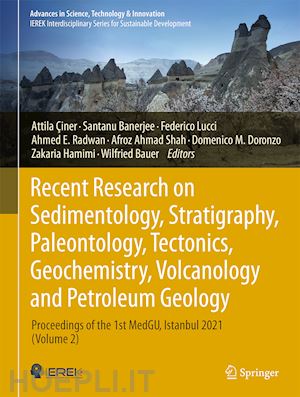
Questo prodotto usufruisce delle SPEDIZIONI GRATIS
selezionando l'opzione Corriere Veloce in fase di ordine.
Pagabile anche con Carta della cultura giovani e del merito, 18App Bonus Cultura e Carta del Docente
This edited book is based on the accepted papers for presentation at the 1st MedGU Annual Meeting, Istanbul 2021. With four parts spanning a large spectrum of geological, geochemical, geophysical and petroleum topics, this book presents a series of newest research studies that are nowadays relevant to Middle East, Mediterranean region, and Africa.
The book covers various topics from the fields of (1) sedimentology, stratigraphy, paleontology, (2) geochemistry, mineralogy, petrology, volcanology, (3) structural geology, tectonics, geodynamics, and (4) petroleum and energy engineering, and petroleum geology. The content of these papers provides new scientific knowledge for further understanding new case studies and approaches in these various topics.
Attila Ciner:
Attila Çiner is a sedimentology and Quaternary geology professor at the Eurasia Institute of Earth Sciences at Istanbul Technical University, Turkey. After graduating from the Middle East Technical University in Ankara (1985), he obtained his M.Sc. degree at the University of Toledo, USA (1988), and his Ph.D. at the University of Strasbourg, France (1992). He works on the tectono-sedimentary evolution of basins and Quaternary depositional systems such as moraines, fluvial terraces, alluvial fans, and deltas. He uses cosmogenic nuclides to date these deposits. He primarily focuses on the glacial deposits and landscapes and tries to understand paleoclimatic and paleoenvironmental changes since the Last Glacial Maximum. Lastly, he was part of the Turkish Antarctic Expedition. He is the editor-in-chief of Mediterranean Geoscience Reviews and the chief editor of Arabian J. of Geosciences, both published by Springer. He has published more than 100 peer-reviewed articles and chapters.
Santanu Banerjee:
Santanu Banerjee currently works as a professor at the Department of Earth Sciences, Indian Institute of Technology Bombay. He does research in sedimentology and petroleum geology. His research areas include authigenic iron silicates, microbially induced sedimentary structures, basin analysis, provenance interpretations, and alternate potash fertilizer. He is on the editorial board of Journal of Palaeogeography, Minerals, Arabian Journal of Geosciences, and Journal of Earth Systems Science. He has published more than 150 papers in SCI-indexed journals, which have received more than 5000 citations.
Federico Lucci:
Federico Lucci holds a B.Sc. in Earth Sciences (2004), a M.Sc. in Earth Sciences (2006), and a Ph.D. degree in Earth Sciences (2010) from Università degli Studi Roma Tre (Italy). Since February 2022, he is a researcher (RTDb) of petrography and petrology at the University of Bari, where is dealing with the teaching course petrography of metamorphic rocks. His research is focused on modeling and timing of magmatic complexes as key-constraint for understanding regional tectonics and geodynamic scenarios, through a multidisciplinary approach that integrates field survey, rock fabric characterization, mineral chemistry, geochemistry, geochronology, inverse and forward thermobarometry, and FC-AFC-Mixing modeling.
Ahmed Radwan:
Dr. Ahmed E. Radwan is an adjunct professor at the Institute of Geological Sciences of the Jagiellonian University (Poland). He has academic and industrial experience, since he obtained his Ph.D. in geophysics at Sohag University, Egypt, besides his proficient work in the oil and gas industry as the department head at the exploration department of the Gulf of Suez petroleum company (Gupco), Egypt. As a post-doctoral research scientist, he attended Innsbruck University in Austria in 2019. In 2020, he joined the Jagiellonian University in Poland. Despite his youth, he has received numerous awards from international organizations such as the International Union of Geological Sciences (IUGS), the Geochemical Society (GS), the Clay Minerals Society (CMS), the Austrian Forschungsgemeinschaft (FG), the Narodowa Agencja Wymiany Akademickiej (NAWA), the Austrian Federal Ministry of Education, Science, and Research (BMBWF), and petroleum companies. He has authored more than 90 papers in highly indexed international peer-reviewed journals, published four chapters, and presented at numerous international conferences.
Afroz Ahmad Shah:
Shah Afroz is an assistant professor of Structural Geology at the Department of Geosciences, Universiti of Brunei Darussalam (UBD). He completed Ph.D. at James Cook University, Australia, in 2010, a postdoctorate at Earth Observatory of Singapore in 2013 and joined his first academic job as a senior lecturer of Structural Geology at Curtin Sarawak, Miri, Malaysia, beforejoining UBD. His research mainly involves the brittle deformation of lithospheric plates, focusing on earthquake-causing faults in South and Southeast Asia. It also includes floods, landslides, and land subsidence hazards. He works on earthquake science education and outreach and frequently writes in newspapers, magazines, and blogs.
Domenico M. Doronzo:
Dr. Domenico M. Doronzo holds a B.Sc., an M.Sc., and a Ph.D. degree in Earth Sciences from Università degli Studi di Bari Aldo Moro, Italy. Investigation specialties related to those degrees are physical volcanology, experimental and computational fluid dynamics, petrology, and natural hazards. Then, he has worked in volcanology and sedimentology, fluid dynamics and combustion, environmental sciences, and rock physics in the USA, Mexico, Spain, and Italy. Currently, he is a contract researcher at Istituto Nazionale di Geofisica e Vulcanologia, Italy. Particularly, he has received the Rittmann Medal from Associazio











Il sito utilizza cookie ed altri strumenti di tracciamento che raccolgono informazioni dal dispositivo dell’utente. Oltre ai cookie tecnici ed analitici aggregati, strettamente necessari per il funzionamento di questo sito web, previo consenso dell’utente possono essere installati cookie di profilazione e marketing e cookie dei social media. Cliccando su “Accetto tutti i cookie” saranno attivate tutte le categorie di cookie. Per accettare solo deterninate categorie di cookie, cliccare invece su “Impostazioni cookie”. Chiudendo il banner o continuando a navigare saranno installati solo cookie tecnici. Per maggiori dettagli, consultare la Cookie Policy.